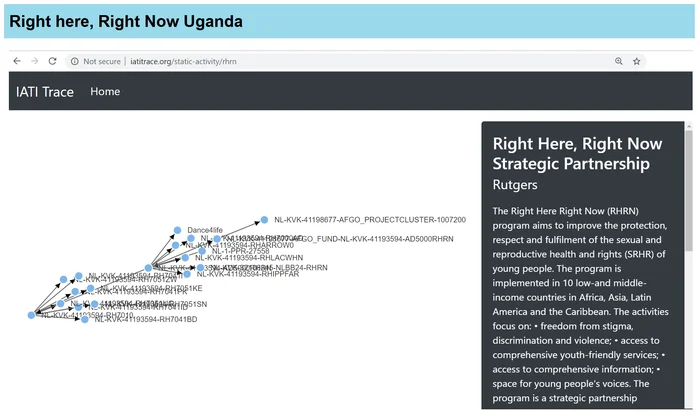Data Use Fund explores traceability within IATI data
Over 1000 international organisations have now published information on their development cooperation using the IATI Standard. However, challenges still remain in ensuring that IATI data offers “traceability,” or the ability to follow the delivery chain when activities involve multiple organisations as funders or implementing partners. Traceability is one of the key elements that enable better tracking of the results or impact of projects, which is increasingly driving funding decisions.
the project looked at how to use IATI data to track aid as it flows from one organisation to another through international delivery chains
As such, a recent project commissioned and funded by IATI’s Data Use Fund explored challenges to traceability within IATI data. Delivered by EyeOpenerWorks and Open Works, the project looked at how to use IATI data to track aid as it flows from one organisation to another through international delivery chains, and remaining challenges to increasing the traceability of funds within IATI.
The project assessed six activities, including in Uganda, Malawi and Somalia. For each activity, the team searched for data in multiple fields of the IATI Standard to identify where funding originated and where it was spent. The specific fields assessed are listed in the final report Exploring Traceability within IATI data: Methodology. The EyeOpenerWorks team also created an interactive visualisation to show which organisation(s) funded the activity and where funds were eventually disbursed to implementing partners.
For example, the activity Right Here, Right Now Uganda was published to IATI by Rutgers, an international NGO based in the Netherlands. The project aimed to promote sexual and reproductive health and rights to young people.

IATI data tracing funding of the project Right Here, Right Now Uganda
The visualisation shows that Right Here, Right Now Uganda was funded by the Dutch government’s Ministry of Foreign Affairs and that Rutgers passed funding from Right Here, Right Now Uganda onto six organisations to implement the project locally:
● Netherlands – Ministry of Foreign Affairs – donor organisation
⮡ Rutgers
⮡ CHOICE for Youth and Sexuality
⮡ dance4life
⮡ Hivos
⮡ ARROW
⮡ IPPF AR
⮡ LACWHN
In the visualisation, each activity is represented by a node (blue dot) and its unique code (called an IATI Activity ID). It shows that the organisations are connected with 18 other activities that have been published to IATI.
Traceability is only made possible if organisations publish IATI data every time they give or receive funding.
Improving traceability
Traceability is only made possible if organisations publish IATI data every time they give or receive funding. Currently a key challenge in enabling traceability within IATI data is the great variation in the quality and completeness of this data published by different organisations. This exploratory work further emphasises that to improve the traceability of financial flows: all activities should contain data for specific ‘traceability’ fields of the Standard (as listed in the methodology paper).
For more information, see the visualisation of all data used for this project online. Do note that this visualisation module is owned and maintained by EyeOpenerWorks and Open Works.